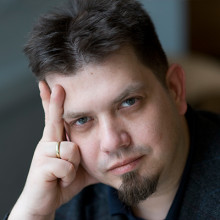Polish literature

Wojciech Wencel
(born in 1972 in Gdańsk) graduate of Polish philology at the University of Gdansk, poet, columnist, literary critic. He lives in Matarnia. He is one of the most important contemporary Polish poets.
He published his first poem in 1993, and the following ones appeared in “Arcana”, “Brulion”, “Zeszyty Literackie” and “Tygodnik Powszechny”. He received many prestigious literary awards (among others – the Kazimiera Iłłakowiczówna Award, the Kościelski Award, the Franciszek Karpiński Literary Award, the Józef Mackiewicz Literary Award). In 2014, the listeners of a Polish national radio station Polskie Radio Program II acknowledged his Oda na dzień św. Cecylii (Ode for St. Cecilia's Day) as the most important volume of poetry written in Polish in the past twenty five years.
Beginning with his first collection Wiersze (Poems) the critics identified his poetry as neoclassical, pointing out how deeply it is rooted in tradition, its formal sophistication, musicality, tendency for seriousness, even pathos. This first tome already displays the poet’s characteristic “ontological sensibility” and “contemplation of passing” (Stefan Chwin), strong ties to the concrete, mostly regarding space, and finally - the sensitivity for the sensual aspect of reality. In the following collections, Wencel’s poems are dominated by metaphysical issues and references to Christianity, with their hero often being a modern man confronted with the experiences of love for God and human, sin, downfall, reformation or sainthood. This was linked with critical diagnoses of the modern world, its desacralization and spiritually confused, which is perfectly exemplified by the volumes Oda chorej duszy (Ode to a Sick Soul) and Ziemia święta (The Holy Land), as well as the poem Imago mundi that reference’s The Waste Land by Eliot. In his manifesto essays collected in the volumes Zamieszkać w katedrze (To Live in a Cathedral) and Przepis na arcydzieło (A Recipe for a Masterpiece) – by referencing Thomas Stearns Eliot, Jarosław Marek Rymkiewicz and Jacques Maritain – he defended the concept of Christian poetry, wrote about classical poetry as a “testimony to living in God’s perspective” and drew the attention of the contemporaries to the blueprint of the “masterpieces illustrating «the secret unity of things».” He also criticised “the narcissism of reason” that in his opinion dominates the modern culture, and the Polis intellectuals for their ties to communism.
Beginning with the Smolensk air crash influenced tome De profundis, the national subject matter, a reflection on the 20th century Polish history, on the historical presence of God, on suffering and evil became more present in Wencel’s poetry, signifying the turn to the neoromantic tradition.
Wencel’s weekly columns published since 1999 (in “Nowe Państwo”, “Wprost”, “Gość Niedzielny”, “Gazeta Polska”, “wSieci”) constitute an important part of his works and are published in separate volumes. They form a private, subjective, often mocking chronicle of modern Polish politics and culture with occasional self-referential moments.
Wencel was a member of the “Fronda” quarterly editorial staff (1997-2007) and a co-founder and a member of the editorial staff of the “44/Czterdzieści i Cztery” magazine. Since 1998 he has been a regular contributor for the “Arcana” bimonthly. In the years 1998-2002 he was a member and then a vice president of the Polish Televison programme board.
After 2010 the poet became involved in grassroots activism, among others through his association with the Solidarni 2010 movement.
– Maciej Urbanowski
BIBLIOGRAPHY
Volumes of poetry:
- Wiersze, Warszawa: Towarzystwo „Ogród Ksiąg”, 1995.
- Oda na dzień św. Cecylii¸ Gdańsk: Wydawnictwo Marabut, 1997.
- Oda chorej duszy, Kraków-Warszawa: bibLioteka, 2000.
- Ziemia Święta, Kraków: Wydawnictwo Literackie, 2002.
- Wiersze zebrane, Warszawa-Ząbki: Fronda – Apostolicum, 2003.
- Imago mundi. Poemat, Warszawa-Kraków: Fronda – AA, 2005.
- Podziemne motyle, Warszawa: Nowy Świat, 2010.
- De profundis: Kraków: Arcana, 2010, 2 wyd. 2011, 3 wyd. 2012.
- Małe Betlejem / Christmastide, Berlin: Mordellus Press, 2011, wyd. bibliofilskie.
- Oda do śliwowicy i inne wiersze z lat 1992–2012, Kraków: Arcana, 2012.
- Epigonia, Kraków: Arcana, 2016.
Essays:
- Zamieszkać w katedrze. Szkice o kulturze i literaturze, Warszawa-Ząbki: Fronda – Apostolicum, 1999.
- Przepis na arcydzieło. Szkice literackie, Kraków: Arcana, 2013.
TRANSLATIONS
Czech:
- in: Souvislosti. Revue pro literaturu a kulturu 2007, nr 3, transl. Jaroslav Šubrt, Lucie Szymanowska.
German:
- in the anthology Das Unsichtbare lieben. Neue polnische Lyrik. Anthologie/ Kochać to, co niewidzialne. Nowa polska poezja. Antologia, transl. Renate Schmidgall, Köln: Kirsten Gutke Verlag, 1998.
Swedish:
- in: 17 polska poeter, transl. Anders Bodegård, Stockholm: FIB:s Lyrikklubb, 2003.